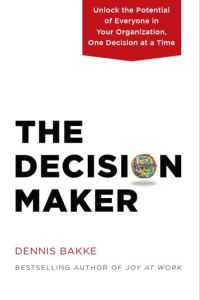加入 getAbstract 阅读摘要

加入 getAbstract 阅读摘要
Dennis Bakke
The Decision Maker
Unlock the Potential of Everyone in Your Organization, One Decision at a Time
Pear Press, 2013
看看什么内容?
Executives are usually farthest from the action. Why, then, do they get to make all the decisions?
Recommendation
Entrepreneur Dennis Bakke co-founded the energy giant AES, where he prioritized corporate responsibility and a deep concern for workers. Then he co-founded Imagine Schools, a nonprofit charter school network dedicated to applying the best learning models to each student’s unique needs. Here, Bakke explains that all employees have the ability to make important work decisions, and he champions the idea that companies should empower their staff members. Through the device of a modern-day corporate fable, Bakke explicates a philosophy that celebrates the intrinsic worth of every individual. While this, like most business fables, requires some suspension of disbelief, getAbstract recommends it as an inspiring story of how to open up the decision-making process in your organization. Bakke explains why letting your employees decide is both smart business and the right thing to do.
Summary
About the Author
Dennis Bakke is co-founder of Imagine Schools and of AES, a global energy company.























Comment on this summary
We are sorry to hear that you're having difficulties downloading this summary. We are working on solving this issue as soon as possible. Meanwhile, I'll send you the PDF of the summary via email.
Enjoy the read and best regards,
your getAbstract team
We are sorry to hear that you're experiencing problems with downloading this summary. I will check with our IT department to see if this is due to a technical issue. In the meantime, I'm happy to send you the summary to your email address. Enjoy the read.
Best regards,
your getAbstract team